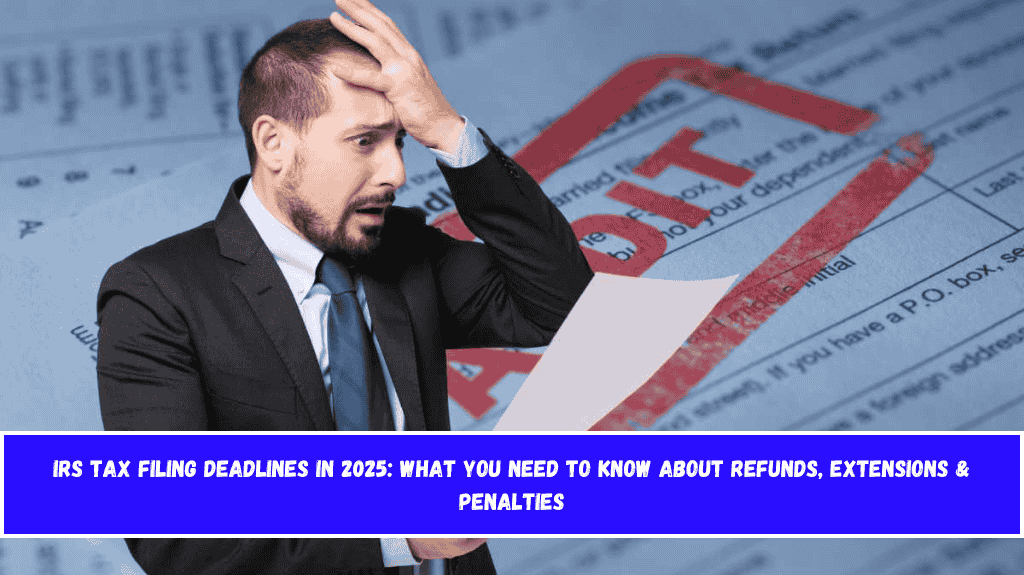Filing taxes in the United States can be tricky, especially if you’re dealing with natural disasters, military service, or need extra time. For the 2024 tax year, the last date to file your federal tax return was April 15, 2025. Missing this date could delay your refund—or even cost you the money altogether if you wait too long.
But not everyone has the same deadline. Depending on your situation, you may have more time to file. Here’s everything you need to know about tax extensions, disaster-related relief, military service exceptions, and voluntary extension options.
Standard Deadline to File Your 2024 Federal Tax Return
The Internal Revenue Service (IRS) set April 15, 2025, as the final date to file your tax return for the 2024 tax year. If you’re expecting a refund, it’s best to file before this date to avoid delays. Filing late without a valid reason could lead to penalties or loss of refund benefits.
Three-Year Rule for Tax Refunds
Even if you miss the April 15 deadline, you still have three years to claim your refund. This means you can file your 2024 return anytime up to April 15, 2028. After that, any unclaimed refund money goes to the U.S. Treasury, and you won’t be able to get it back. So if you’re owed money, don’t wait too long.
IRS Extensions for Disaster-Affected Areas
Some states hit by natural disasters get automatic tax extensions. In 2025, residents of Alabama, Florida, and seven other states received an extended deadline up to May 1, 2025, because their areas were declared disaster zones by FEMA (Federal Emergency Management Agency).
You don’t have to apply for this extension—it’s automatic. But it’s a good idea to include a short note explaining where you live and how the disaster affected your ability to file.

Tax Extensions for Military Members in Combat Zones
If you’re in the military and serving in a combat zone, the IRS gives you extra time. You get 180 days from the day you leave the combat zone, plus any remaining time from the original deadline.
For example, if you return from a combat zone on June 1, 2025, your tax deadline will be extended to December 1, 2025.
To qualify, you must attach Form DD-214 or a note from your commanding officer. You also get other benefits like exemption from tax on combat pay, which is detailed in IRS Publication 3.
How to File a Voluntary Extension with Form 4868
Not in a disaster area or the military? You can still ask for more time to file—up to October 15, 2025—by submitting Form 4868. This extension gives you more time to file your paperwork, but you still need to pay your estimated taxes by April 15 to avoid penalties.
Here’s how to file with Form 4868:
- Estimate your tax: Use the IRS Withholding Calculator.
- File the extension: Use IRS.gov or any tax software to submit Form 4868.
- Pay what you owe: Use IRS Direct Pay, credit card, or check.
- Complete your tax return: Send the full return by October 15, 2025.
What Happens If You Miss the IRS Deadlines?
If you’re expecting a refund, there’s no penalty for filing late—but if you wait past April 15, 2028, you’ll lose your money forever. On the other hand, if you owe taxes and miss the deadline, the IRS will start charging penalties:
- 5% per month on the unpaid tax
- Up to 25% maximum per year
So, even if you can’t pay everything now, it’s better to file and pay as much as you can to avoid these charges.
IRS Resources to Help You File
The IRS offers helpful tools and support to make the filing process easier:
- IRS Free File: For low-income earners to file online for free.
- Interactive Tax Assistant (ITA): For answering common tax questions.
- In-person support: Available in IRS offices across major cities. These resources have been improved in 2025 to help reduce the $1.5 billion in unclaimed refunds each year.
Filing your tax return on time is important, especially if you’re waiting for a refund or want to avoid penalties. The IRS does provide extra time for people in disaster zones, military personnel, and even those who ask for an extension using Form 4868.
But remember—the longer you wait, the more you risk losing money or paying more. Use the tools and resources available, and don’t let your hard-earned refund slip away.


















Leave a Reply